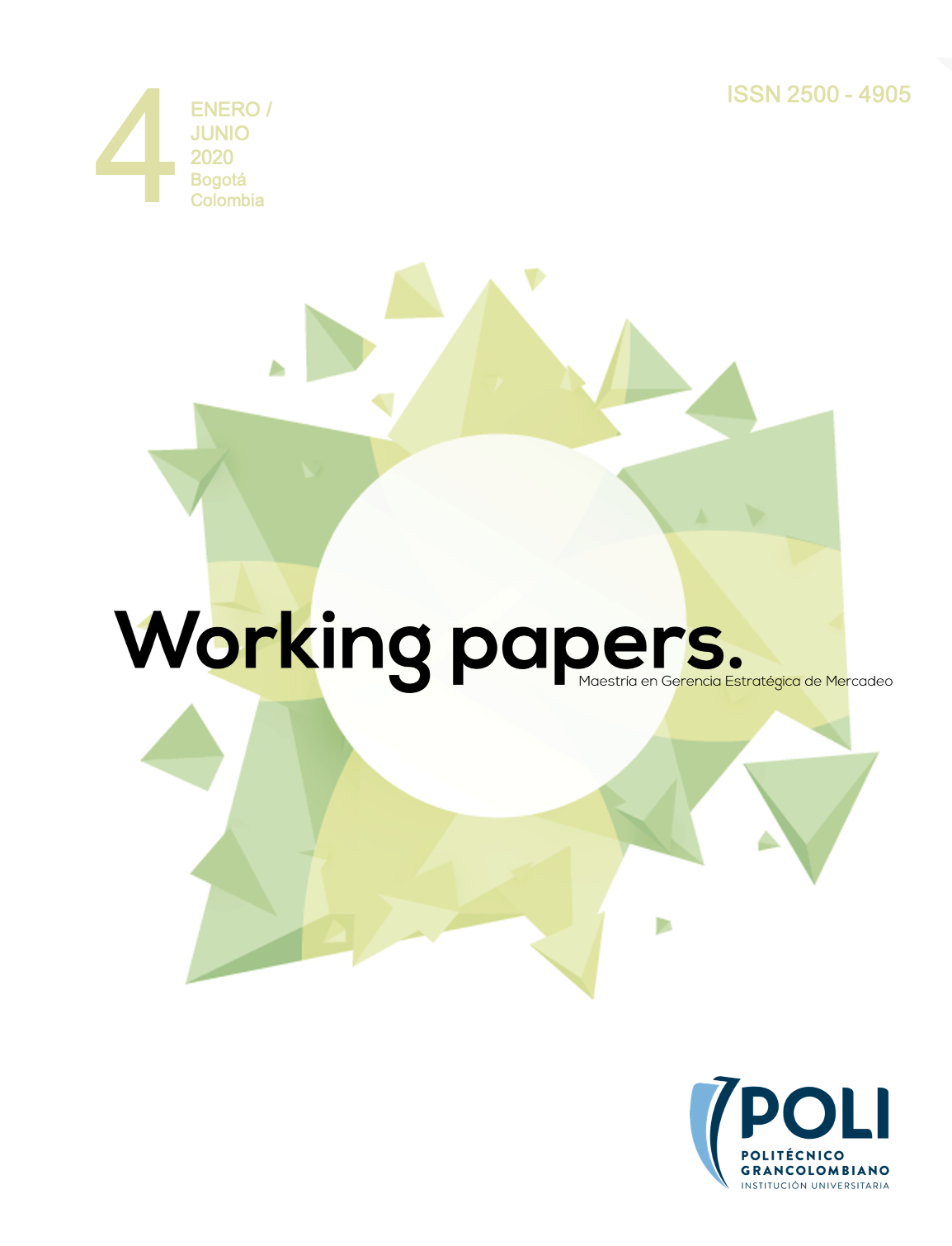Resumen
El presente escrito pretender brindar una aproximación conceptual al estado del arte del mercadeo educativo, partiendo de la evolución histórica de la disciplina de marketing, recorriendo rápidamente las escuelas de pensamiento y nuevos paradigmas a fin de comprender la aplicación y relevancia de esta joven disciplina en el contexto de la educación terciaria o superior bajo la premisa de incitar a académicos e investigadores a involucrarse en este campo de conocimiento, el cual a pesar de haber tenido un crecimiento significativo durante estas tres últimas décadas, aun propone grandes retos en materia de teorizaciónReferencias
AMA. (2020). 2020 Higher Ed Marketing Trends Roundup. American Marketing Association. https://www.ama.org/2020/01/14/2020-higher-ed-marketing-trends-roundup/
Anderson, P.F. (1983) ‘Marketing, Scientific Progress, and the Scientific Method’, Journal of Marketing, 47(4): 18–31. http://dx.doi.org/10.2307/1251395
Arum, R., & Roksa, J. (2011). Academically adrift: Limited learning on college campuses. Chicago: The University of Chicago Press.
Ball, S.J. (2004) Education for Sale! Commodification of everything? Annual Education Lecture at the Karl Mannheim Professor of Sociology of Education Institute of Education, University of London.
Barnett, R. (2011). The marketised university: defending the indefensible. In M. Molesworth, R. Scullion, & E. Nixon (Eds.), The marketisation of higher education and the student as consumer. London & New York: Routledge Taylor & Francis Group.
Brown, S. (1995) Postmodern Marketing. London: Routledge.
Brownlie, D., Saren, M., Wensley, R. and Whittington, R. (eds) (1999) Rethinking Marketing: Towards Critical Marketing Accountings. London: Sage.
Easton, G. (2002) ‘Marketing: A Critical Realist Approach’, Journal of Business Research, 55(2): 103–109. http://dx.doi.org/10.1016/S0148-2963%2800%2900145-4
Foskett, N. (2012). Marketisation and education marketing: The evolution of a discipline and a research field. En The Management and Leadership of Educational Marketing: Research, Practice and Applications (Vol. 15, pp. 39-61). Emerald Group Publishing Limited. https://doi.org/10.1108/S1479-3660(2012)0000015004
Gajda, A. (2009). The trials of academe the new era of campus litigation. New York: Harvard University Press.
Gewirtz, S., Ball, S., & Bowe, R. (1995). Markets, choice and equity in education. Milton Keynes, UK: Open University Press
Hall, H. (2018). The marketisation of higher education: symptoms, controversies, trends. Ekonomia i Prawo. Ecomomics and Law, 17(1): 33–42. http://dx.doi.org/10.12775/EiP.2018.003
Hall, H., & Witek, L. (2016). Conditions, contemporary importance and prospects of higher education marketing on the example of Polish universities. Procedia Economics and Finance, 39, 206-211.
Hunt, S.D. (1976) ‘The Nature and Scope of Marketing’, Journal of Marketing, 40(3): 17–26. http://dx.doi.org/10.2307/1249990
Hunter, J. B. (1991). Which school? A study of parents’ choice of secondary school. Educational Research, 33(1), 31–41.
Hutchinson, K.D. (1952) ‘Marketing as Science: An Appraisal’, Journal of Marketing, 16(January): 286–292. http://dx.doi.org/10.2307/1247541
Jack, G. (2008) ‘Postcolonialism and Marketing’, in M.Tadajewski and D.Brownlie (eds) Critical Marketing: Issues in Contemporary Marketing, pp. 363–384. Chichester: John Wiley.
Jonathan, R. (1990). State education or prisoner’s dilemma. The ‘hidden hand’ as a source of education policy. Educational Philosophy and Theory, 22(1), 16–24.
Jones, B., Shaw, E., & McLean, P. (2011). The Modern Schools of Marketing Thought. En The SAGE Handbook of Marketing Theory (SAGE Publications Ltd, pp. 45-28).
Judson, K.M., & Taylor, S.A. (2014). Moving from marketization to marketing of higher education: the co-creation of value in higher education. Higher Education Studies, 4(1). DOI:10.5539/hes.v4n1p51
Keen, C., & Greenall, J. (1987). Public relations management in colleges, Polytechnics and universities. Banbury, UK: Heist Publications
Kotler, P., & Fox, K. (1995). Strategic marketing for educational institutions (2nd ed.). Englewood Cliffs, CA: Prentice Hall.
Krachenberg AR (1972) Bringing the concept of marketing to higher education. Journal of Higher Education 43: 369–380.
Maclaran, P., Saren, M., Stern, B., & Tadajewski, M. (2011). Introduction. En The SAGE Handbook of Marketing Theory (SAGE Publications Ltd, pp. 1-24).
Maringe, F., & Gibbs, P. (2009). Marketing higher education. Maidenhead, UK: McGraw Hill.
Monieson, D.D. (1988) ‘Intellectualization in Marketing: A World Disenchanted’, Journal of Macromarketing, 8(2): 4–10. http://dx.doi.org/10.1177/027614678800800202
Naidoo, R. (2007) HE as a global commodity, Observatory on Borderless Higher Education.
Newman, S., & Jahdi, K. (2009). Marketization of education: Marketing, rhetoric, and reality. Journal of Further and Higher Education, 33(1). https://doi.org/10.1080/03098770802638226
Reay, D. (1998). Setting the agenda; the growing impact of market forces in pupil grouping in British secondary schools. Journal of Curriculum Studies, 30(5), 545–558.
Scott, D., Brown, A., Lunt, I. and Thorne, L. (2004) Professional Doctorates: Integrating Professional and Academic Knowledge. Milton Keynes: Open University Press.
Shaw, E., Jones, B., & McLean, P. (2011). The Early Schools of Marketing Thought. En The SAGE Handbook of Marketing Theory (SAGE Publications Ltd, pp. 27-41).
Sherry, J.F. (1991) ‘Postmodern Alternatives The Interpretive Turn in Consumer Research’, in T.S.Robertson and H.H.Kassarjian (eds) Handbook of Consumer Research, pp. 548–591. Englewood Cliffs: Prentice-Hall.
Sheth, J.N. (1992) ‘Acrimony in the Ivory Tower: A Retrospective on Consumer Research’, Journal of the Academy of Marketing Science, 20(4): 345–353. http://dx.doi.org/10.1007/BF02725211
Siegel, H. (1988) ‘Relativism for Consumer Research (Comments on Anderson)’, Journal of Consumer Research, 15(1): 129–132. http://dx.doi.org/10.1086/209152
Stachowski, C. A. (2011). Educational Marketing: A Review and Implications for Supporting Practice in Tertiary Education. Educational Management Administration & Leadership. https://doi.org/10.1177/1741143210390056
Symes, C. (1998). Education for sale: A semiotic analysis of school prospectuses and other forms of educational marketing. Australian Journal of Education, 42(2), 133-152.

Working Papers by Institución Universitaria Politécnico Grancolombiano is licensed under a Creative Commons Reconocimiento-NoComercial-SinObraDerivada 3.0 Unported License.
Creado a partir de la obra en http://www.poligran.edu.co/wpmgem

